Silence Is Killing Your Career, Here's How To Overcome It
You’re “being humble” and “not wanting to brag” yet you’re actually sabotaging your leadership potential. Here’s why your inaction is costing you promotions and respect.
Picture this: You’re sitting in the weekly stakeholder meeting, and your Director asks for input on the new feature prioritization. You have a strong opinion based on user research and competitive analysis you’ve been working on. But instead of speaking up, you stay quiet, thinking:
“I don’t want to seem pushy. Someone else will probably say something similar anyway.”
Sound familiar?
Hiding in the shadows costs you credibility, promotions, and impact.
Let me be clear: I’m not talking about being an arrogant know-it-all who dominates every conversation (e.g. like some technical experts you may know). I’m talking about the quiet erosion of your leadership presence that happens when you consistently choose comfort over courage.
Product leadership thrives on visibility, strategic thinking, and decisive action. Yet many aspiring leaders sabotage their careers by playing small:
hiding behind humility,
avoiding tough conversations, or
clinging to tasks they should delegate…
This isn’t modesty: it’s self-censorship masquerading as virtue.
💸 The Hidden Cost of “Playing It Safe”
“Silence isn’t golden. It’s a career killer.”
True Story
Two years ago, I worked with a talented PM, let's say her name was Sarah. Sarah had a good sense of product (more so than other colleagues of mine) and could spot market opportunities with ease. However, she was always passed over for management positions, while less experienced (but more vocal) colleagues were promoted.
Why? Because Sarah had fallen into what we call the “Invisible Expert Trap.”
She was doing exceptional work but failing to make it visible.🤷♀️ She’d send detailed emails instead of presenting in meetings. She’d defer to others opinions even when she had superior insights. She’d minimize her achievements with phrases like “It was just a team effort” or “I got lucky with the timing.” (Guilty too 🙋🏻♀️)
Sarah thought she was being humble. In reality, she was being invisible.
The wake-up call came during her performance review when her manager said: “Sarah, I know you’re incredibly capable, but I need to see more leadership from you. I can’t promote someone who doesn’t demonstrate executive presence.”
💡 That’s when Sarah realized that her “humility” was actually preventing her from serving her team, her product, and her career in the way she was truly capable of.
Sarah it could be you, your colleague, even your own boss and their boss. It happens to many of us in our careers, unfortunately there are people out there still struggling with this.
🍀 The Four Leadership Killers You Must Avoid
Based on my experience and conversations with colleagues and leaders, here are the most common ways we sabotage our own leadership:
🤐 The Silent Treatment in Meetings
► What it looks like: You attend meetings but rarely contribute. You wait for others to speak first. You have insights but keep them to yourself because “someone else will probably say it better.”
► Why it’s damaging: Leadership is about influence, and you can’t influence from the sidelines. When you consistently stay quiet, stakeholders start to question your value and capability.
► The real cost: Your colleagues begin to see you as a passive participant rather than a strategic leader. When promotion time comes, they can’t imagine you leading at a higher level because they’ve never seen you lead at your current level.
🙋♀️ The “Just Happy to Be Here” Syndrome
► What it looks like: You deflect praise, minimize your achievements, and constantly attribute success to “the team” or “good timing.” You avoid taking credit for your wins.
► Why it’s damaging: If you don’t advocate for your own contributions, why should anyone else? Your manager needs to understand your impact to justify your promotion.
► The real cost: You become invisible in a role that requires high visibility. Your achievements get attributed to others, and you’re seen as a “doer” rather than a “leader.”
🤝 The Over-Delegator’s Dilemma
► What it looks like: You delegate everything to avoid seeming controlling, but you also avoid making tough decisions. You let your team struggle with problems you could solve because you don’t want to “micromanage.”
► Why it’s damaging: There’s a difference between delegation and abdication. Great leaders know when to step in and when to step back.
► The real cost: Your team loses confidence in your leadership. Stakeholders start going around you to get answers. You’re seen as ineffective rather than empowering.
🤷♀️ The “I Don’t Want to Brag” Mentality
► What it looks like: You avoid difficult conversations, don’t push back on unrealistic requests, and say “yes” to everything to keep everyone happy.
► Why it’s damaging: Product management is inherently about making trade-offs and difficult decisions. If you can’t do that, you’re not doing your job.
► The real cost: Your product suffers, your team gets burned out, and you’re seen as someone who can’t handle the hard parts of leadership.
How I Learned to Stop Sabotaging Myself
I was guilty of all these behaviors early in my career. I remember a particular incident where I had identified a major usability issue in our product that was causing customer churn. Instead of presenting my findings directly to leadership, I buried them in a lengthy email that got lost in everyone's inbox.
Three weeks later, sales was furious and escalated the situation with my manager citing the exact issues I had identified.
I saw it coming and did nothing about it, but what hurt the most was that my entire team was demolished. They took the blame and moved on even though credibility among other departments was damaged. It was harder to regain trust after that.
💡 That's when I realized that my "humility" wasn't protecting anyone but quite the opposite: it was actually hurting my team, my product, our users, and the organization.
The shift happened when I started reframing my mindset:
Instead of thinking: "I don't want to seem pushy"
I started thinking: "My insights could prevent problems for my team and users"
Instead of thinking: "Someone else will probably say this"
I started thinking: "What if no one else has this perspective?"
Instead of thinking: "I should just be grateful for what I have"
I started thinking: "How can I create more value in a bigger role?"
The Confident Leader's Playbook
Here's what I've learned about building authentic leadership presence without becoming an arrogant know-it-all jerk:
🎯 Reframe Your Contribution Mindset
Stop thinking about speaking up as "showing off" and start thinking about it as serving your team and users. When you have valuable insights and keep them to yourself, you're actually being selfish.
Action step: Before every meeting, prepare at least one thoughtful question or insight to share. Make it about adding value, not getting attention.
📊 Document and Communicate Your Impact
Humility doesn't mean hiding your achievements. It means presenting them in a way that focuses on the value created rather than personal glory.
Action step: Create a simple monthly report that highlights your key contributions, decisions made, and their outcomes. Share it with your manager and key stakeholders.
🤝 Practice Strategic Delegation
Great leaders know the difference between delegation and abdication. They empower their teams while taking responsibility for outcomes.
Action step: When delegating, be clear about the outcome you need, the timeline, and the level of support you'll provide. Follow up regularly without micromanaging.
💬 Have the Hard Conversations
Leadership requires courage to address difficult topics. Your job isn't to make everyone happy, it's to make the right decisions for your product and users.
Action step: Schedule regular one-on-ones (1:1s) with stakeholders to address concerns before they become bigger problems. Use frameworks like Non-Violent Communication to make these conversations productive.
🎤 Develop Your Executive Presence
Executive presence isn't about being loud or dominant. It's about being thoughtful, decisive, and authentic.
Action step: Practice summarizing your point of view in 30 seconds or less. Learn to disagree professionally. Take up appropriate space in meetings.
The Compound Effect of Confident Leadership
When you start showing up as a confident leader, several things happen:
Your team gains confidence in your direction. They stop second-guessing decisions and start executing with more conviction.
Stakeholders begin to trust your judgment. They come to you for advice instead of just status updates.
You attract better opportunities. People want to work with and promote leaders who demonstrate clear value.
Your impact multiplies. Instead of just executing tasks, you start shaping strategy and driving meaningful change.
But What About Authenticity?
I hear this concern a lot: "But if I start speaking up more and taking credit, won't I seem inauthentic?"
Here's the thing: authenticity isn't about being small. It's about being true to your values while maximizing your positive impact.
👉 If you're naturally analytical, be the person who asks the tough questions that others avoid.
👉 If you're naturally empathetic, be the person who ensures user needs are represented in every decision.
👉 If you're naturally strategic, be the person who connects the dots between initiatives.
Your authentic leadership style is the one that leverages your natural strengths while serving your team and users.
Final Thoughts
The Path Forward: Taking Action Today
If you recognize yourself in any of these patterns, here's what you can do immediately:
This week: Identify one meeting where you can contribute a valuable insight. Prepare your point in advance and speak up confidently.
This month: Schedule a one-on-one with your manager to discuss your career goals and ask for specific feedback on your leadership presence.
This quarter: Start documenting your impact and sharing it appropriately with key stakeholders.
💡 Remember: The world needs confident product leaders who can navigate complexity, make tough decisions, and drive meaningful change.
Your humility should fuel your desire to serve at a higher level, not limit your impact at your current level.
✋ Stop apologizing for your expertise.
✋ Stop minimizing your contributions.
✋ Stop waiting for permission to lead.
🫡 Your team is counting on you.
🫡 Your users are counting on you.
🫡 Your career is counting on you.
What's one leadership behavior you're going to change this week? Drop your thoughts in the comments. I'd love to hear about your experiences and support your growth journey! 👇
P.S. If this resonated with you, you might also enjoy my post on how to be an assertive product manager where I dive deeper into specific communication techniques. 😉
How To Be An Assertive Product Manager
As product managers, we often find ourselves in situations where we need to communicate effectively with a diverse group of stakeholders. From executives to investors, and from customers to peers, our ability to convey ideas clearly and assertively can make or break our success.


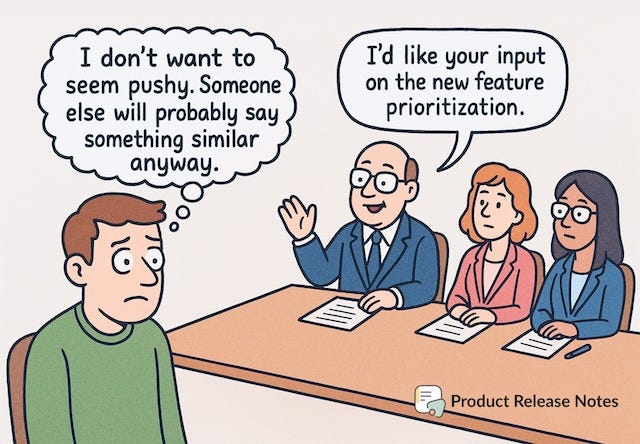
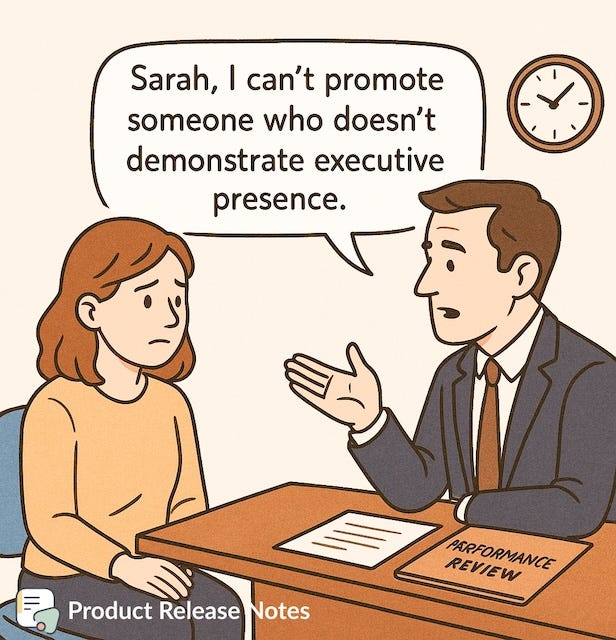
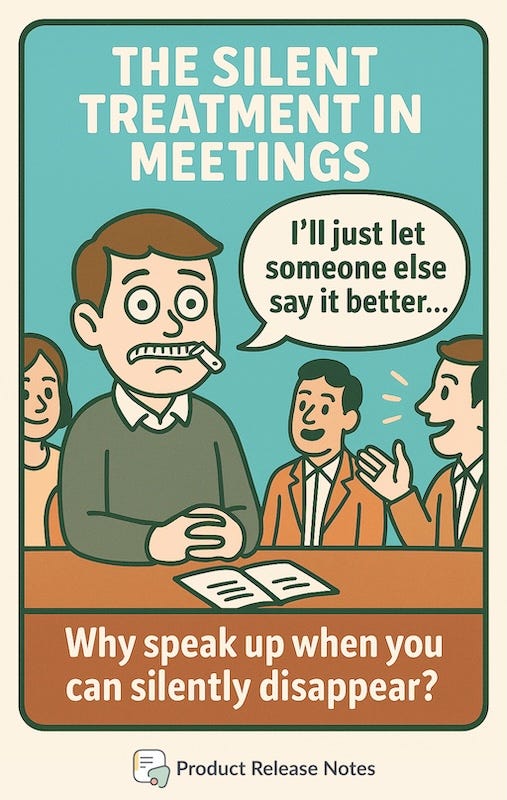
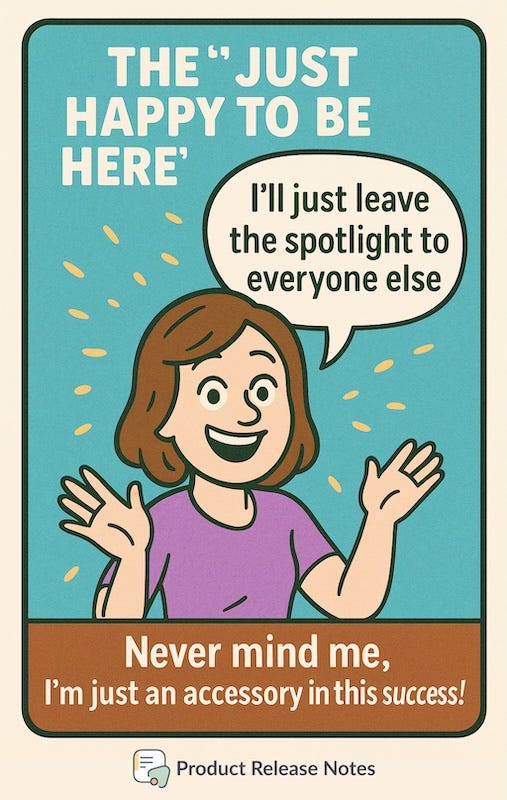
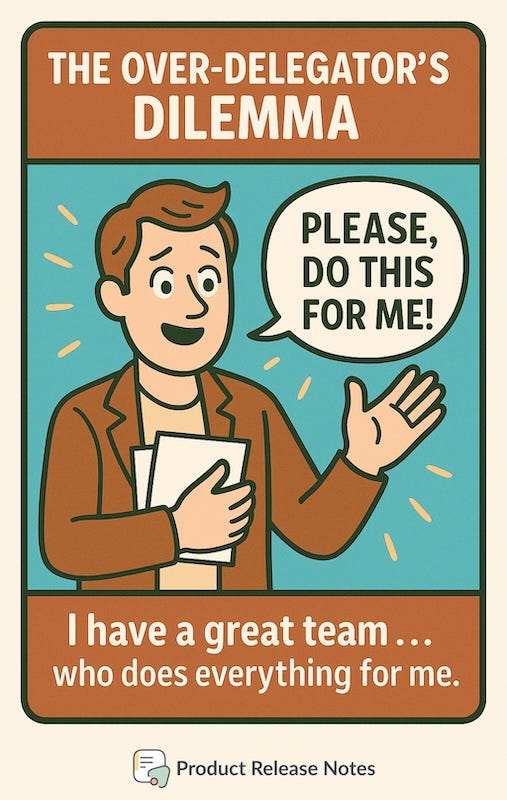
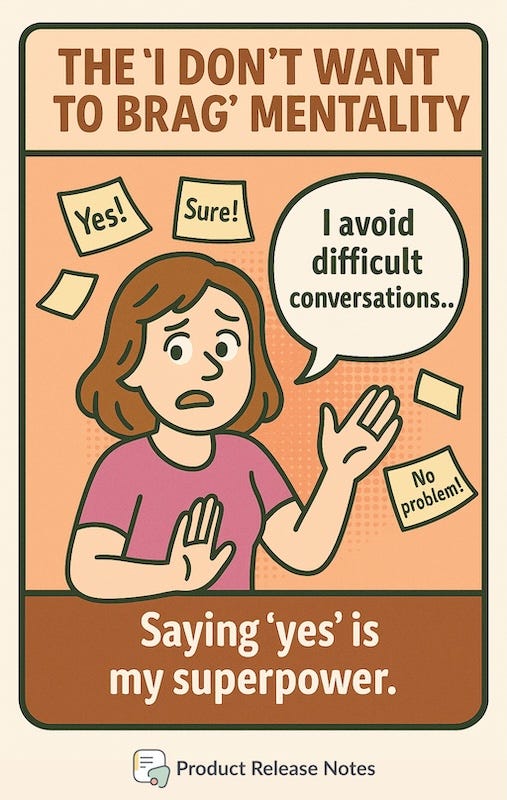

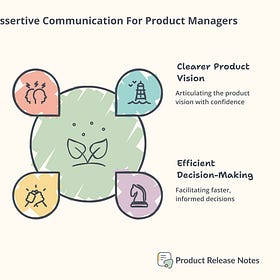
One thing to do also is track your silent moments for about a week. Every time you hold back a great thought, write it down right away. You'll be shocked how many brilliant insights you're just keeping to yourself every day...
I had the "I don't want to brag" mentality for years. It took a mindset shift to remind myself it is not bragging, but rather just explaining, since I can't assume people know what I am working on and hte impact.